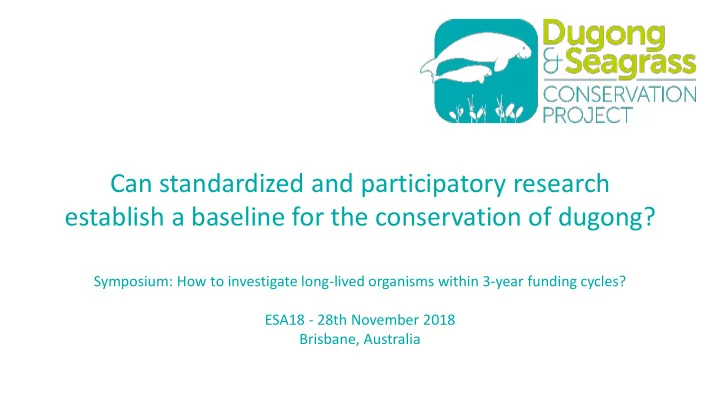

Can standardized and participatory research establish a baseline for the conservation of dugong? Symposium: How to investigate long-lived organisms within 3-year funding cycles? ESA18 - 28th November 2018 Brisbane, Australia
The Dugong & Seagrass Conservation Project • Objective: to enhance the effectiveness of conservation of dugongs and their seagrass ecosystems across the Indian and Pacific Ocean basins • Timeframe: 2015 to 2018 • GEF-5 support: US $5.88M • 8 countries: Mozambique, Madagascar, Sri Lanka, Malaysia, Indonesia, Timor- Leste, Solomon Islands and Vanuatu • 30+ Partners implementing 42 local projects 120+ locations
Map of Project Locations by Country Based on the CMS Dugong MoU map of range states
Research Component • Standardized methods and tools The tools and approaches: - comparability and consistency • CMS Dugong Catch/ By-catch • Money and time efficiency Questionnaire Allows for tracking trends • Seagrass-Watch • • Traditional Ecological Seeks local communities' input Knowledge • Allows for building local capacities • Technical advice by UN Environment CMS Dugong MoU advisers
CMS Dugong catch/ bycatch questionnaire • Questionnaire was adapted for Vanuatu • In-country training conducted by member of CMS Dugong technical Group • VESS conducted a training for the Solomon Islands Partners.
CMS Dugong catch/ bycatch questionnaire Vanuatu Solomon Islands • • 537 interviews conducted on 32 297 interviews with 47 islands throughout Vanuatu. communities in 6 provinces. • • More than half of the Dugongs are sighted respondents indicated sightings throughout the archipelago in of dugongs during the past year most of the major island groups • The opportunistic kill of dugongs in Vanuatu. still occurs either for food or • 849 historic sightings were commercial gain. recorded • A small number of people still • 20 dugong hotspots identified actively hunt dugongs. • 6 hotspots identified as high priority for conservation efforts.
Dugong Hotspots in Vanuatu
DUGONG Fisheries Management (Prohibited Activities) R egulations 201 8* - the harvest or killing of dugongs is not permitted - the capture and capitvity of dugongs is not permitted - you are not allowed to sell, buy or export a live or dead dugong If you know anyone breaking this law please contact Ministry of Fisheries and Marine R esources, Compliance Section - 391 43 $40 ,0 0 0 FINE* No Harvest ing T his poster is produced and supported by: 2
Seagrass-Watch - Vanuatu • Training workshop was held in Vanuatu for Vanuatu and Solomon Islands project partners.
Seagrass-Watch - Vanuatu • Permanent monitoring sites identified in four locations in Vanuatu. • Eight monitoring events have taken place.
Seagrass-Watch – Solomon Islands • Seagrass mapping conducted across seven sites • Seagrass monitoring integrated into LMMA resource monitoring annual work plan.
Challenges • Lack of baseline conservation and socio-economic information • Lack of awareness of the importance of seagrasses and dugongs • Lack of policy frameworks and capacity for policy enforcement • Lack of capacity and personnel to implement projects and enforce regulations and laws. • Remoteness of the study areas
Enabling conditions • Team of technical advisors • Toolkit • Central coordination • Inception workshop • Annual meetings • Institutions’ support
Where to next? • Project Closing Meeting in February 2019 • Further collaborative research • Vanuatu – research is continuing, in collaboration with Murdoch University Marine Megafauna Research Unit, to survey dugong hotspots using unmanned aerial vehicles. • Solomon Islands – dugong and seagrass maps currently under development
Vanuatu Fisheries Department
THANK YOU! Contact Information: • Vanuatu Christina Shaw, CEO, Vanuatu Environmental Science Society, vess@vanuatuconservation.org • Solomon Islands Alec Hughes, CEO, Coastal Marine Management, alec@c-m-2.com • Global Project Maya Bankova-Todorova, Project Coordinator, Mohamed bin Zayed Species Conservation Fund, mbankova@mbzfund.org
Recommend
More recommend